 It is right there on the box: the spice must flow. And the spice does continue to flow thanks to the continued attention to expanding content for the classic game of Dune which was reissued by Gale Force Nine in 2019. Since then, we have been treated to two expansion boxes, with the third hitting shelves now.
It is right there on the box: the spice must flow. And the spice does continue to flow thanks to the continued attention to expanding content for the classic game of Dune which was reissued by Gale Force Nine in 2019. Since then, we have been treated to two expansion boxes, with the third hitting shelves now.
Dune continues to be a game for the right group, and it rewards those who dive deep into its systems and embrace the chaos. The Ecaz & Moritani expansion is designed by Jack Reda and adds two new factions, bringing that total up to twelve. It also embraces more of the narrative of the universe originally created by Frank Herbert. Is this new content essential to enjoy the game? Let’s sandwalk our way into the details.
Expansion Overview:
To understand where this expansion fits into the Dune game’s world, we need to make note of what has already been added to the core gameplay. First, the Ixians & Tleilaxu expansion added two fan-favorite factions with enhancements to the revival tanks and win conditions. Next, the CHOAM & Richese expansion added two more factions which impacted the economy and bidding, as well as added new leader skills and advanced strongholds. The new factions this time around are House Moritani and House Ecaz.
Moritani is all about terror tactics. They place forces onto the board after all other factions and have six terror tokens to spread throughout the land. These one-time-use tokens are added to strongholds and may be triggered when opposing forces enter or ship into the token location. Effects range from leader assassination, to extortion, to sneak attacks, and more. Moritani also has a powerful alliance option called Enemy of My Enemy, which allows them to forge (or force?) an alliance instead of revealing a terror token.
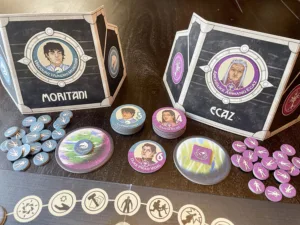
Whereas Moritani is about rifts and subterfuge, Ecaz is about forging strong alliances. Ecaz start with five random ambassador tokens that may be added to strongholds at the cost of spice. Each ambassador token provides a specific effect thematically tied to its printed faction and is triggered when opposing forces enter the token location. For example, a Fremen ambassador allows you to move a group of your forces on the board to any territory (subject to storm and occupancy rules). Moritani also has an Occupy bonus that allows them to enter ally spaces as if they are a part of that faction.
There is also a new leader without a traitor card, Duke Prad Vidal, who shifts between these new houses. He is gained by Moritani if they are in two battles in strongholds during a turn. Ecaz gains him through the use of an ambassador token. When triggered, Ecaz gains Vidal if he’s not in the tanks or captured. They can also offer him to the faction that triggered this token if they agree to an alliance, though he is only available to them for the current turn.
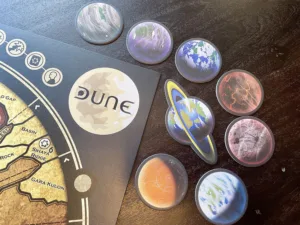
This expansion adds new variant modules. The first, Homeworlds, provides each faction with their own home planet that houses off-world troops. Based on the number of troops in inventory, the home world either has a benefit when lots of troops are in inventory, or a potential downside if troops are away on a planet. The second variant is called Nexus Cards and provides benefits to factions that do not ally during the Nexus phase. Each card has three possible effects titled Betrayal, Cunning, and Secret Ally, based on whether the faction is in the game or not.
The third major module is Discovery Tokens. New spice blow cards feature one of two icons, Hiereg or Smuggler. When drawn, a random token is added to this spice blow location. The Hiereg tokens can be viewed at any time by the Fremen, whereas the Smuggler tokens can be viewed at any time by the Spacing Guild. Any faction occupying the space receives the token benefit. These range from spice stashes, to ornithopters, to a secret stronghold.
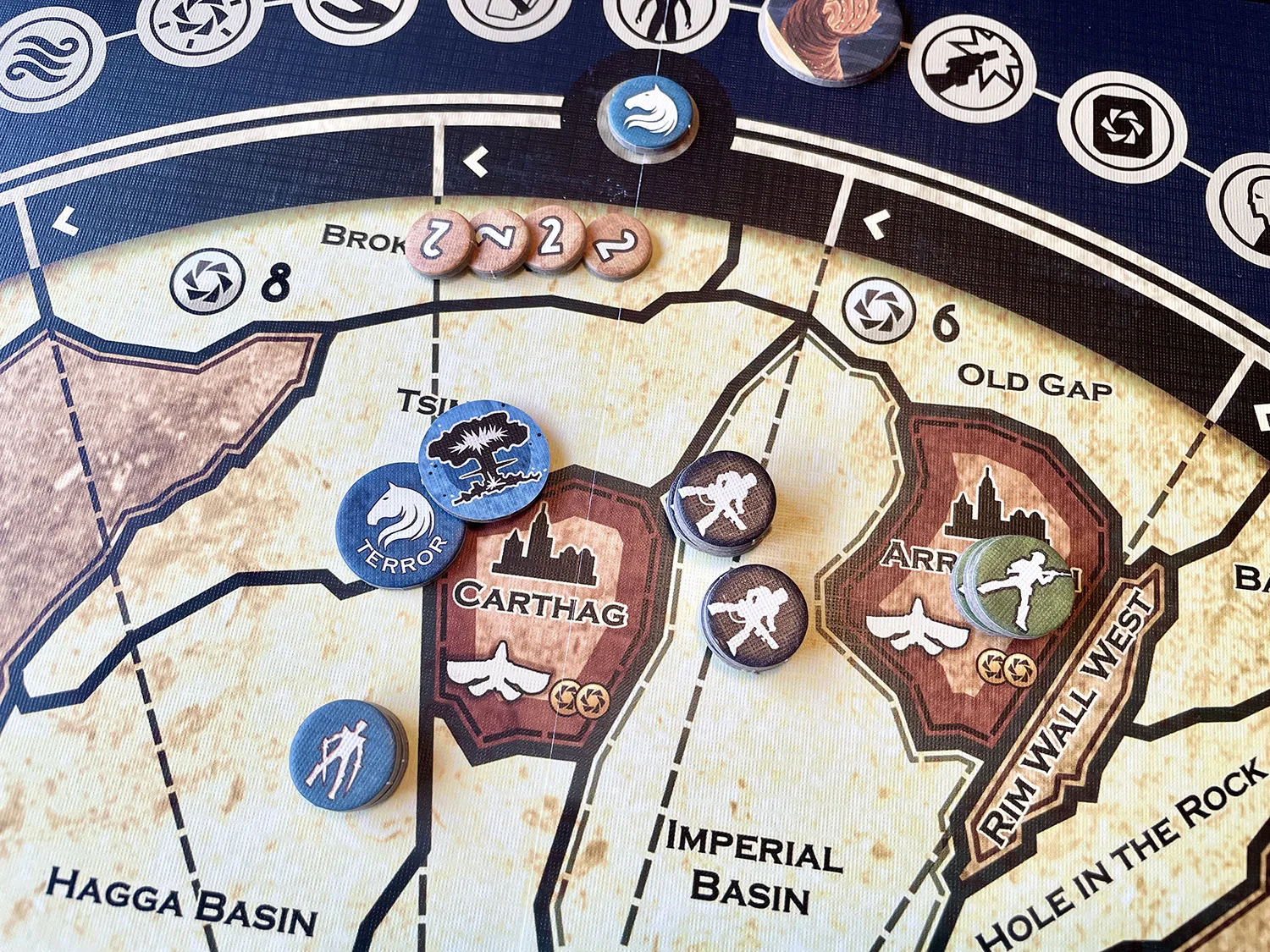
Game Experience with the Expansion:
For fans of the Dune game, this expansion aims to expand the narrative world as well as provide new places to explore. In the previous two expansions, it was the new factions that provided excitement, but here I’ve found the most enjoyment with the new variant modules. This is not to diminish the two new house factions, which tell a unique story on their own, but rather give kudos to the improvements added by fleshing out the design space further.
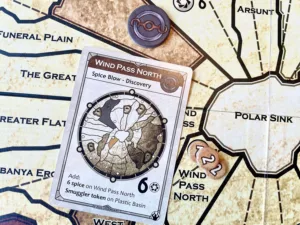
Taking a step back, I have felt that the previous two expansions were hit or miss, even if they have added new elements to consider. The variant modules like stronghold advantage and tech tokens have all felt unnecessary, and I think they’ve been replaced by the options included in this new expansion. Out of the earlier modules, the leader skills have provided the most interest from my group, though we don’t deem them necessary.
The new modules are excellent. The idea to include Nexus cards that provide a benefit to someone who’s unable to ally (i.e., in odd player count games) adds a perfect enhancement to the base ruleset. These cards not only have a thematic flair with their secret ally ability but provides a new alliance decision space. Do I wait out an alliance to gain an upper hand in a stronghold battle? Am I already out of the game and want to add some chaos to the mix? These cards are here to provide answers to these questions.
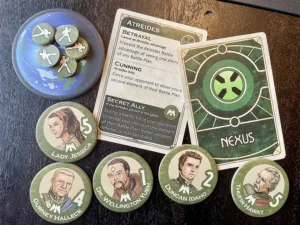
The Homeworlds module is also distinctive in that it provides an enhanced base of operations. I would not recommend this for new players, but those familiar with advanced rules can easily add this to a session. Each planet provides varying benefits, but there is also the threat of opponent forces shipping to your planet and attempting to occupy it. If this happens, the occupying force gains an advantage against you. While it pulls away from the central objective of taking strongholds, there is more agency at play with your faction and the decision to ship forces onto the planet.
The Discovery Tokens module shines a light on the dark corners of Arrakis. It’s another addition that pulls away from the central mission, but in doing so it also creates more spice generation options, as well as the potential for a hidden stronghold. There are also storm control and travel options with these which can be useful at key times during play. This is not an auto-include but will see play from time to time as a nice way to promote movement.
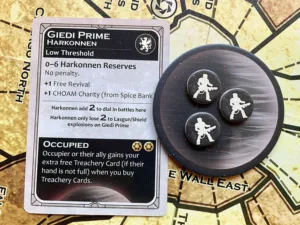
This leaves us with the new factions. Both have a similar approach: place tokens and reap the benefits. They just apply themselves differently—one wants to destroy and the other wants to align. The interesting thing is that having both in play at the same time makes the Duke Vidal leader more interesting, though I don’t see needing to have both in play at the same time. I think both factions are great and embrace different approaches to the game, but the added mystery and threat of the Moritani tokens edge out the ambassador options from Ecaz.
Final Thoughts:
After dabbling in each of the expansions, it’s hard to determine which is essential. I think piecing together bits from each provides a lot of intrigue for each session, though not one expansion stands alone above the rest. With a game like Dune, much is determined by group composition, and these expansions allow groups to experiment with what works best for them. Everything is easy to implement though Dune remains a dense tactical experience that pushes beyond the structure of its phases. With the Ecaz & Moritani expansion, I think thematically everything is well considered. There is the essential (Nexus Cards) and the rest comes down to your time spent on-planet.
 Hits:
Hits:
• Nexus Cards
• Homeworlds
• Rulebook includes themed faction combinations
Misses:
• Duke Vidal shines with both factions in play
• Moritani is cutthroat
• Ecaz benefits from higher player counts





















